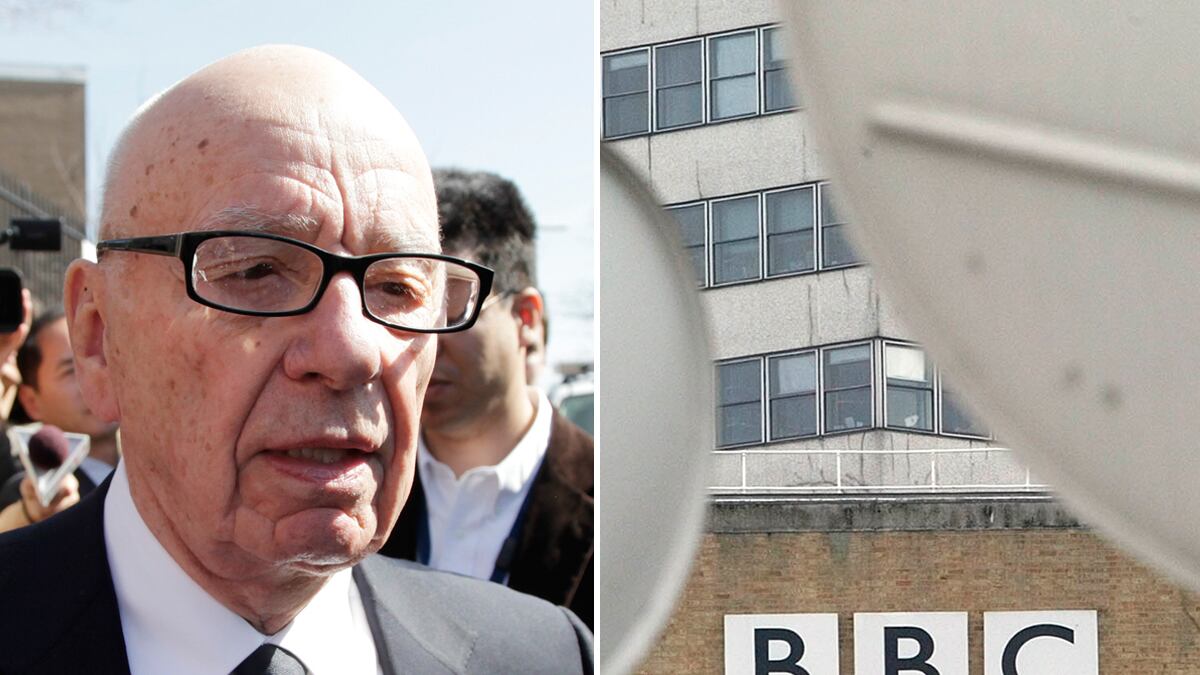Rupert Murdoch’s News Corporation, whose British News International subsidiary is currently subject to three criminal investigations and a public inquiry, now appears to be locked in a battle of wills with the country’s powerful public-service broadcaster, the BBC, over a documentary that the BBC plans to screen this Monday.

The prime time BBC1 Panorama documentary “Murdoch’s TV Pirates”—postponed from two weeks ago—has already been the subject of legal warnings. On Saturday News Corp.’s lawyers, PSB Law LLP, reportedly sent a confidential legal message to various media companies warning them not to reproduce the allegations it expects the BBC to air tonight. According to the letter, the synopsis of the documentary published on the BBC’s website as part of its advanced advertising billing for the program suggests that the documentary may contain “serious, defamatory, false and highly damaging” allegations against News Corp.
The program synopsis from the BBC website states: “As Rupert Murdoch faces accusations of law breaking and corruption at his British tabloid newspapers, Panorama reveals fresh hacking allegations at the heart of News Corporation's pay-TV empire.”
But so far the warning seems to have backfired because the TV listings remain in place and news outlets like the Daily Telegraph and the commercial TV operator ITV are already reporting on the controversy.
The antagonism between News Corp. and the BBC goes back a long way. Thirty years ago, after his successful bid for Times Newspapers Ltd., BBC Panorama confronted Rupert Murdoch with a critical documentary of his proprietorship of the News of the World, Sun, Australian, and New York Post. Murdoch responded by calling the BBC “elitist,” and most of his newspapers have campaigned against it ever since.
In 2009, in a speech that paved the way for a takeover of the main pay-TV satellite channel BSkyB, James Murdoch accused the BBC of having a “chilling” effect on commercial news, and called for the corporation to be downsized. A year later, the Conservative Liberal Democrat Coalition cut the BBC’s income by 16 percent.
The BBC documentary due to be aired tonight apparently examines “hacking allegations in the News Corp.’s pay-TV empire” that has already been the subject of protracted legal disputes. The News Corp. subsidiary NDS, which holds the encryption code for many satellite-TV smart cards has been a target of police investigations since 1996 when an Israeli tax raid on the NDS HQ in Jerusalem reportedly uncovered evidence of board members bugging their rival’s phones, as documented in Neil Chenoweth’s book Virtual Murdoch. In 2002 NDS was sued in California for $1 billion by rival smart-card manufacturer Nagrastar and its parent company Echostar for hacking their access cards, and by Canal Plus for passing on these details to pirates.
Eventually Canal Plus exited the case when its Italian arm was bought by News Corp. to create Sky Italia. In 2008 a Californian jury found in Echostar’s favor over the piracy allegations but awarded only nominal damages. The subsequent appeal process went all the way up to the Supreme Court, which last week upheld the allegations that NDS had violated antipiracy laws but still refused to reverse a previous ruling that Echostar should cover the $19 million legal costs incurred by NDS. In Italy, Nagrastar is still locked in litigation with Sky Italia over hacking allegations. The executive in charge of Sky Italia, Tom Mockridge, replaced Rebekah Brooks as chief executive of News International when she resigned over the phone-hacking scandal in Britain this summer. Last September Financial Review reported NDS was being put up for sale to “distance” it from News Corp. Ten days ago—a few days after the planned first broadcast of the Panorama documentary—NDS was sold to Cisco for $5 billion.
These complex legal maneuvers have largely escaped public attention, but if—as promised by the advanced billing—the Panorama program can connect the hacking allegations to “former senior police officers,” this could comprise an emotive new twist. The head of NDS security since 1993 is a former Metropolitan Police commander named Ray Adams, and The Guardian recently reported that he was the subject of two internal police corruption investigations before he left the police force. The program billing also suggests that it has investigated more than one senior police officer. The current module of the Leveson Inquiry, established last year to examine the ethics and culture of the press after the original News of the World hacking-scandal broke, has been looking at the close relationship between senior officers and the press, especially that of senior Metropolitan Police members and senior executives at Rupert Murdoch’s U.K. subsidiary News International.
Meanwhile, in the U.S., the day after Panorama in the U.K. a Frontline documentary “Murdoch’s Scandal” will air on PBS. Made by Lowell Bergman, the investigative journalist memorably played by Al Pacino in The Insider, the show promises to explore how the phone-hacking scandal was eventually broken in the U.K. As it tries to avoid further investigations under the Foreign Corrupt Practices Act (which could lead it liable to large fines and the indictment of senior executives), neither of the two documentaries next week can be welcome for News Corp.
A News International spokesperson was asked to comment on these revelations but has declined to respond.
The BBC embargoed previews of the Panorama documentary until transmission.





